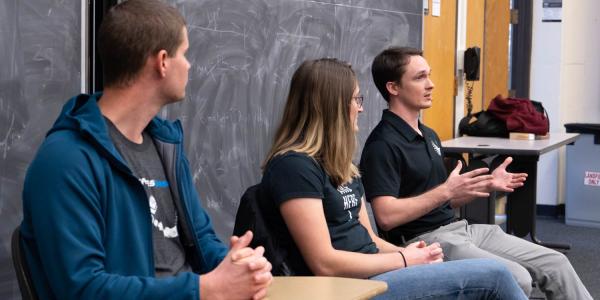 Assistant Professor Kaushik Jayaram is part of an interdisciplinary team who have received a University of Colorado Boulder Outreach Award for their efforts to get the next generation of STEM programming into rural K-12 schools in Colorado.
Assistant Professor Kaushik Jayaram is part of an interdisciplinary team who have received a University of Colorado Boulder Outreach Award for their efforts to get the next generation of STEM programming into rural K-12 schools in Colorado.
New science standards in Colorado require students to learn by working through problems rather than memorizing facts. These new standards, based on Next Generation Science Standards, represent a significant change in what students will be expected to know and how science teachers will teach.
To address these changing needs, Jayaram and his team want to develop a bioinspired robotics toolkit and an accompanying curriculum that will emphasize real-world problem-solving and hands-on learning. They call it “Build a Better Bug.”
The team brings together a diversity of disciplines. Along with Jayaram, Alexandra Rose of the Ecology and Evolutionary Department will help lead the team. Distinguished Professor William Penuel of the School of Education, Nathan McNeill, Stacey Forsyth and Scott Sieke will also lend their expertise in education.
The toolkits are inspired by Jayaram’s research in his Animal Inspired Movement and Robotics Laboratory, where Jayaram and his research team study concepts from biology and apply them to the design of real-world engineered systems. In his lab, you can find robots modeled after the body morphologies of cockroaches and spiders.
“We are fundamentally interested in understanding why animals are the way they are,” said Jayaram, “and how we can build bioinspired robots that can address social needs, like search and rescue, environmental monitoring or even use them during surgery.”
The toolkits will give middle school students a chance to combine biology and robotics in their own ways. The kits will feature origami-based foldable body and appendage designs that are inspired by a variety of insects, such as cockroach legs, ladybug wings or mantis claws.
After combining and rearranging parts to make their own unique bug, the students will use Python/Arduino-compatible open-source electronics to drive the robot and its biologically inspired sensors. Also, the students will have a Chromebook-compatible app to program, communicate and play with their designs.
While building and interacting with their robot bugs, students will probe the underlying principles of what makes certain species evolutionarily successful and how we could perhaps learn from those insights.
“I love the opportunity to work at the intersection of biology and engineering,” Rose said. "And I hope to co-opt students’ excitement about robots to get them secretly learning about topics as seemingly diverse as physics, physiology, evolution, and the engineering design process.”
By leveraging CU’s partnership with Colorado Mesa University, Jayaram and his cohort plan to target an audience in a more rural part of the state to pilot the project. Also, they plan to work with the Eureka McConnel Science Museum in Grand Junction, which runs educational and youth camps and served 26,682 learners in 2022 alone.
“We want our primary audience to be students who don’t have ready access to the exciting science and engineering happening at CU,” Jayaram said. “That includes students who live away from the urban centers of our state.”
Jayaram also hopes the project can address gender biases in STEM through the way in which it bridges robotics with so many other different disciplines.
As Jayaram and his cohort pilot “Build a Better Bug,” they plan to collect feedback from both students and teachers. Through photos, student-made videos, interviews and reflection exercises, they will fine-tune the toolkits and accompanying curriculum for future iterations.
“We are excited to field-test these materials and believe that they will create impactful learning experiences for students,” Jayaram said.
Jayaram and his collaborators are actively looking for talented undergraduate and graduate students who would like to contribute to the project. If you have experience in computer science and electronics and are interested in education and outreach, don’t hesitate to reach out: Kaushik.jayaram@colorado.edu.



